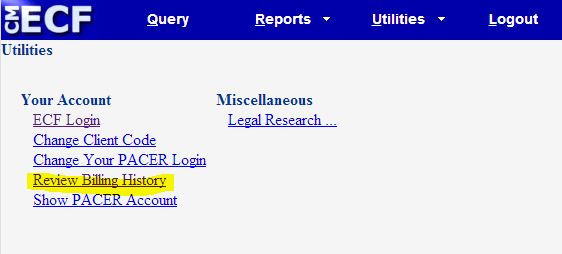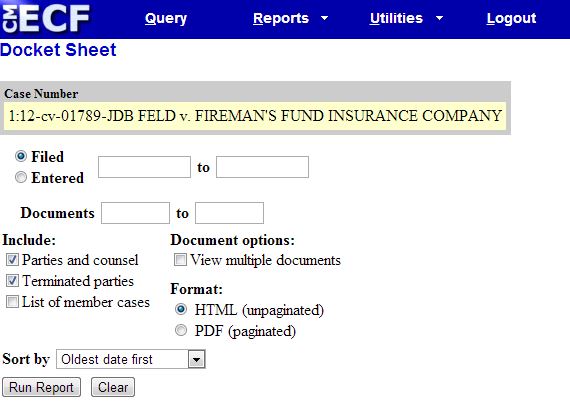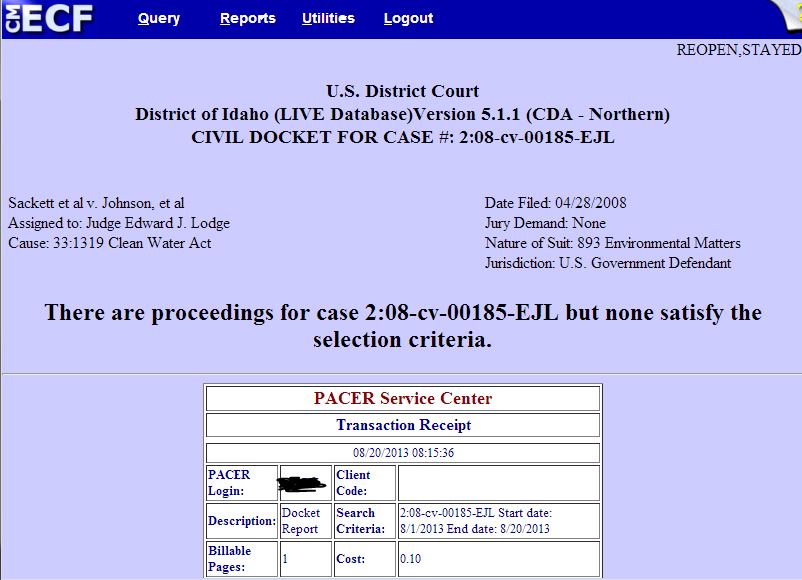Thanks to tweets from John Hawkinson (@johnhawkinson), I’m now aware that there is a way to access detailed daily transactions.
There is a link to a form that provides this, though the link is not available (as far I can see) from the primary Manage My Pacer page at PACER. The link is available at some district courts ECF systems, via the Utilities submenu. Only some of the courts, though. For instance, it’s available from the Massachusetts district court.

But it’s not available from the Idaho district court’s ECF page.

Regardless, it works for all courts…once you can find the link. And now we have the link. Hurrah!
John also mentioned about the various forms of querying for the docket. The one I use looks like the following:
This is for the court case related to Sackett vs. EPA, one of the court cases I follow. I use this to access documents directly, or print out History, which is the docket sheet.
There is another method of querying that does give you more finite control of accessing the docket sheet. The query for this looks like the following:
This is one of the peripheral cases I’m following for my Ringling Brothers book. This query page does provide more finite control over the history page (docket sheet) that’s returned. It is an effective way of only accessing recent docket entries.

But you’re still going to get charged, even if there’s been no update and no docket entries are returned.

PACER should not be charging for queries, it should be charging for document access. And again, consistency would go a long way towards transparency.
John also mentioned that, though the courts follow the same laws, they do have different local rules. So, the Massachusetts district court has one set of local rules, the DC district court has another.
However, the authorization for PACER is federally mandated, and the system is definitely centralized. At least at some point. If it weren’t, when I query for pages in the Idaho court, I wouldn’t be able to access this transaction using the utilities in the Massachusetts court…but I can. Immediately, in fact.
The local rules don’t, and should not, impact on how PACER works. They may impact on what’s filed, fees, when something is filed, what a judge does, how big a document a document can be, how many separate files are uploaded, but it shouldn’t impact on the underlying PACER system. They may impact on each court’s CM/ECF (Case Management/Electronic Case File) system, but that’s not PACER.
Keep the two separate in your mind, because they’re not the same thing. They may run off the same data but they are not the same thing.
By not being consistent, some user accessing the Sackett court case is unaware of the link that allows them to check their daily transactions. However, a person accessing one of the Ringling Brothers court cases can easily access this link from the Utilities menu from the case query page. And no one has access to it from their main Manage My Pacer account page.
That’s just plain cracked.
It gets worse when you access the RSS feeds. Some contain one form of query page for accessing the document associated with the new docket entry; others return a different query page. Sure, this works, if you only access documents for one court. You would never see the inconsistencies. But this is the internet … people using PACER are frequently interested in court cases from multiple courts.
Do I need to repeat my statement about this being just plain cracked?
Lastly, John mentioned the fact that our federal courts are being strangled by the sequester.
I am more than sympathetic to the courts when it comes to the fact that they don’t have sufficient funding. I’m appalled we would strangle an important component of our government over childish bickering on budgets. Our Congress should be deeply ashamed.
However, the absurdities due to sequester are not PACER’s responsibility. And PACER can’t be used to fix a broken Congress.
